2023, Volume 29, Issue 1
THE EMPIRIC ANTIMICROBIAL THERAPY: THE COMPARISON OF INITIAL CHOICE WITH THE RESULTS OF MICROBIOLOGICAL INVESTIGATIONS. AN OBSERVATIONAL STUDY
DARIUSZ TOMASZEWSKI1, ANETA GUZEK2, ZBIGNIEW RYBICKI3
-------------------------------------------------------------------------------------------------
1Department of Anaesthesiology and Intensive Therapy, Military Institute of Aviation Medicine
2Section of Microbiology, Department of Laboratory Diagnostics, Military Institute of Medicine
3Department of Anaesthesiology and Intensive Therapy, Military Institute of Medicine
Autor korenspondencyjny: DARIUSZ TOMASZEWSKI; Department of Anaesthesiology and Intensive Therapy, Military Institute of Aviation Medicine; email: d.tomaszewski@wiml.waw.pl
Full text
Streszczenie
Introduction: Hospital infections are serious medical problem, causing deterioration in patients’ outcome, prolonged hospital stay and increase costs of hospitalization. Rapid administration of wide spectrum antimicrobial agents is a well known way to increase patient survival rate. Aim: To analyze the efficacy of initial empiric antimicrobial treatment in a large academic hospital.
Methods: In this retrospective cohort study, the initial choice of empiric therapy was compared with the results of the microbiological investigation and the susceptibility/resistance of isolated pathogens.
Results: Between February 1, 2018 and February 1, 2020, a total number of 267 samples were analyzed. Amongst all 267 samples 163 (61%) were positive and 104 (39%) were negative. In those 163 samples 247 pathogens were isolated. In empirical therapy the most frequently administered antibiotic was meropenem (55/267, 20.6%), vancomycin (16/267, 6%), meropenem with vancomycin (14/267, 5.2%), ceftazidime (11/267, 4.1%), and imipenem/cilastatin (5/267, 1.9%).
The total number of samples where the empiric therapy corresponded with the results of microbiological tests was 166. There were forty-seven (28.3%) Gram positive bacteria, including 11 MRSA and 1 VRE, and 119 (71.7%) Gram negative pathogens, including 35 K. pneumoniae ESBL+, 12 A. baumannii, and 2 E. coli ESBL+.
In 81 cases, the isolated pathogens were resistant to empirically administered drugs.
The empiric antimicrobial therapy complied with the results of microbiological analyses in 67.2% (166/247) of cases.
Conclusion: In our center, meropenem and vancomycin seem to be a good choice in empiric therapy.
Słowa kluczowe
nosocomial infections, anti-bacterial agents, drug therapy, combination
